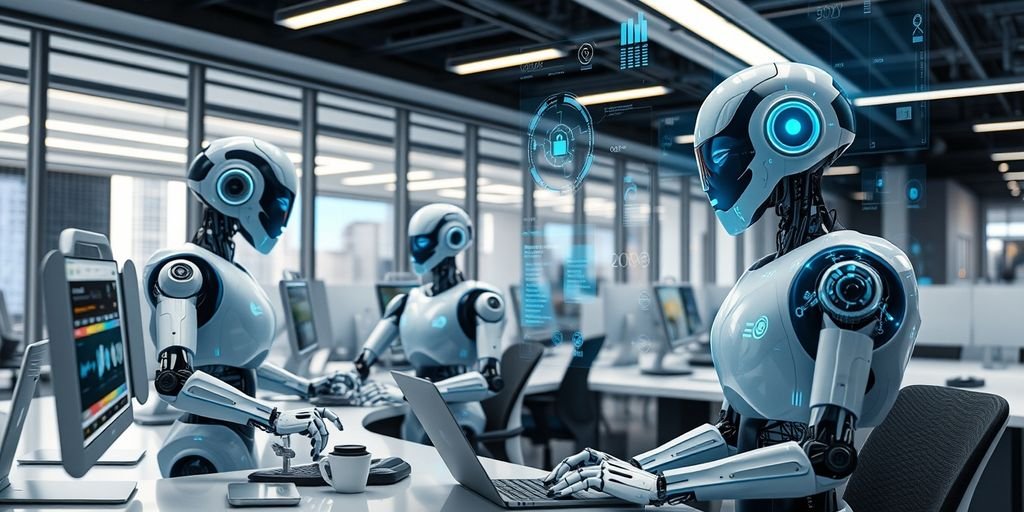In the dynamic landscape of software development, AI-powered code generators have emerged as transformative tools, redefining the way businesses approach software creation and maintenance. These advanced technologies not only enhance the efficiency of developers but also promise higher quality and reliability in the end products. As we delve into the impact of AI on code generation and quality assurance, as well as the latest AI-driven innovations in software development, it becomes clear that these tools are not just augmenting human capabilities but are also shaping the future of the industry.
Key Takeaways
- AI-powered code generators and testing tools are significantly reducing manual coding efforts and improving software quality and reliability.
- Innovations like AI-driven DevOps and automated documentation are streamlining the software development lifecycle, leading to unprecedented efficiency.
- While AI tools offer substantial benefits, they complement rather than replace the need for skilled developers, ensuring human oversight remains integral.
The Impact of AI on Code Generation and Quality Assurance
Automated Code Generation: Beyond the Basics
The evolution of AI-powered code generation has been a game-changer in the software development industry. With tools like OpenAI’s GPT-3, developers are now able to generate code snippets from natural language descriptions, which has significantly sped up the development process. This leap forward allows developers to dedicate more time to complex problem-solving and high-level design tasks.
In recent months, the focus has shifted towards not just generating code, but ensuring that the generated code is of high quality. AI code generators are now being evaluated on their ability to produce code that is not only functional but also maintainable and efficient. The table below showcases some of the top AI code tools that have been trending for their high-quality code generation capabilities:
| AI Code Tool | Key Feature | Notable Benefit |
|---|---|---|
| OpenAI Codex | Natural language understanding | Reduces manual coding effort |
| GitHub Copilot | Contextual code suggestions | Enhances developer productivity |
| CodeBERT | Semantic code search | Improves codebase navigation |
The integration of AI into code generation is not just about automation; it’s about elevating the quality and efficiency of the software we build.
As we continue to explore the potential of AI in code generation, it’s clear that the technology is moving towards a future where AI tools will not only write code but also refine and optimize it. This trend is a testament to the ongoing innovation in the field and the relentless pursuit of more productive and reliable software development practices.
Intelligent Testing: Ensuring Reliability and Performance
The advent of AI in software testing has been a game-changer, offering unprecedented levels of efficiency and quality assurance. AI-driven testing tools like Testim and Applitools are at the forefront, utilizing machine learning algorithms to automate and enhance testing processes. These tools are not only accelerating release cycles but also improving test coverage by identifying UI inconsistencies and detecting visual bugs.
To ensure the reliability and performance of AI-generated tests, it’s crucial to undertake a thorough assessment. Here’s a succinct guide:
- Verify test assertions to ensure they align with the expected behavior.
- Assess test completeness, covering all scenarios and edge cases.
- Identify limitations and biases in the AI model used for test generation.
It’s essential for testers to be well-versed in the software’s functionality and security best practices to effectively interpret and analyze AI-generated tests. This includes identifying potential limitations or biases and augmenting with manual tests when necessary.
As AI continues to evolve, staying informed about the latest trends and tools is vital for businesses to maintain a competitive edge. Recent discussions, such as those in ‘AI in Software Testing | Enhancing Quality and Efficiency – TestGrid’ and ‘AI Software Testing: The Ultimate Guide | Functionize’, highlight the ongoing impact and strategies for implementing AI in software testing.
Optimizing CI/CD Workflows with AI
In the realm of software development, AI has become a pivotal force in enhancing Continuous Integration/Continuous Deployment (CI/CD) workflows. By integrating AI into these processes, businesses are witnessing a transformation in how software is built, tested, and deployed.
- Continuous Integration/Continuous Deployment (CI/CD): AI automation not only streamlines the integration and deployment of code changes but also accelerates the delivery of updates, ensuring that software improvements reach users more swiftly.
- Performance Monitoring: Real-time application performance monitoring by AI tools helps in pinpointing bottlenecks and recommending necessary optimizations, ultimately improving the end-user experience.
By harnessing the power of AI, businesses can significantly increase efficiency, reduce costs, and enhance the overall quality of their software development projects.
The recent trend of incorporating AI into DevOps has led to the creation of next-level CI/CD pipelines that are more robust and efficient. AI’s ability to analyze vast amounts of data and learn from it means that it can predict potential issues before they occur, optimize testing procedures, and even suggest improvements to the codebase.
AI-Driven Innovations in Software Development
AI-Driven DevOps: A New Era of Efficiency
The integration of AI into DevOps is revolutionizing software engineering practices, leading to a paradigm shift in how development and operations teams collaborate. AI-driven automation is not just a trend; it’s a transformative force that enhances efficiency and automates tasks, driving innovation across the tech development landscape.
One of the most significant advantages of AI in DevOps is the ability to automate repetitive tasks, which results in increased productivity and reduced time-to-market. This automation extends to various stages of the software development lifecycle, including Continuous Integration/Continuous Deployment (CI/CD) and performance monitoring. Here’s how AI is making an impact:
- Continuous Integration/Continuous Deployment (CI/CD): AI automation enables seamless integration and deployment of code changes, allowing developers to deliver updates quickly and efficiently.
- Performance Monitoring: AI-powered tools can monitor application performance in real-time, identify bottlenecks, and suggest optimizations to enhance user experience.
The future of software development lies in leveraging AI to stay competitive and meet market demands. By minimizing errors and inconsistencies, AI not only improves the quality of software products but also provides cost-effective solutions that accelerate the delivery process.
Automated Documentation: Streamlining Knowledge Transfer
In the realm of software development, automated documentation has emerged as a pivotal tool for enhancing knowledge transfer among teams. Recent trends have seen a surge in the adoption of sophisticated documentation tools designed to meet the evolving needs of developers. For instance, GitHub has expanded its capabilities beyond version control to include features that support collaborative coding, high-end security, and automation, making it an indispensable tool for modern development practices.
Another noteworthy tool that has gained traction is ProProfs Knowledge Base software. It stands out as a user-friendly platform that enables rapid creation of comprehensive software documentation. This ease of use is crucial for maintaining up-to-date documentation, which is often a challenge in fast-paced development environments.
The integration of these tools into development workflows not only streamlines the documentation process but also ensures that valuable knowledge is effectively captured and shared. This leads to a more cohesive and informed team, capable of tackling complex projects with greater efficiency.
The table below highlights some of the key features of popular documentation tools that have been trending in the past three months:
| Tool | Key Feature | User-Friendly | Collaborative | Security |
|---|---|---|---|---|
| GitHub | Automation | Yes | High | Strong |
| ProProfs | Out-of-the-box documentation | Yes | Moderate | Standard |
By leveraging these tools, businesses can foster a culture of continuous learning and improvement, ensuring that their software development practices remain agile and competitive.
Code Refactoring with AI: Simplifying Maintenance and Upgrades
The advent of AI-powered refactoring tools has marked a significant milestone in the evolution of software development. These tools, which began to surface in the 2000s, are now indispensable for developers, especially when dealing with legacy codebases. AI refactoring tools enhance readability and maintainability, making complex code more approachable.
AI-driven code optimization not only refines code for better performance but also ensures that large-scale projects run efficiently, where every millisecond of performance is crucial.
Moreover, AI’s role in code review processes cannot be overstated. By automating error detection and suggesting improvements, AI helps maintain high standards of code quality. This is particularly beneficial in a collaborative environment where maintaining accurate repository maintainer information is key to efficient teamwork.
While the benefits are clear, it’s important to acknowledge the challenges and limitations of AI in coding. Addressing these concerns is essential for the continued advancement and integration of AI tools in software development.
Conclusion: Harnessing AI to Propel Software Development Forward
As we have explored throughout this article, AI-powered code generators are not just a fleeting trend but a transformative force in the realm of software development. These intelligent tools are reshaping the way businesses approach coding, testing, and deployment, offering unprecedented levels of automation and efficiency. From automated code generation to intelligent debugging and optimization, AI is enabling developers to focus on creative problem-solving and high-level design. However, it’s crucial to remember that these advancements are tools to augment human expertise, not replace it. The true potential of AI in software development lies in its symbiotic relationship with developers, where each complements the other’s strengths. As businesses continue to adopt and integrate these AI-driven innovations, they will find themselves at the forefront of a more agile, innovative, and competitive software industry.
Frequently Asked Questions
How are AI-powered code generators transforming software development for businesses?
AI-powered code generators like GitHub Copilot use machine learning algorithms to assist developers by suggesting code snippets, speeding up the development process, and reducing manual effort. This allows businesses to increase productivity, improve code quality, and reduce time-to-market for software products.
What role does AI play in ensuring the reliability and performance of software?
AI plays a crucial role in software testing by automatically creating test cases, identifying bugs, and optimizing testing processes. This leads to faster, more reliable software releases, as AI can detect issues that might be overlooked by manual testing, ensuring high performance and reliability.
Can AI replace human developers in software development?
While AI can significantly enhance the software development process by automating certain tasks, it cannot replace human developers. AI-powered tools require human oversight and coding abilities to guide the development process, make strategic decisions, and ensure that the software meets business and user needs.



